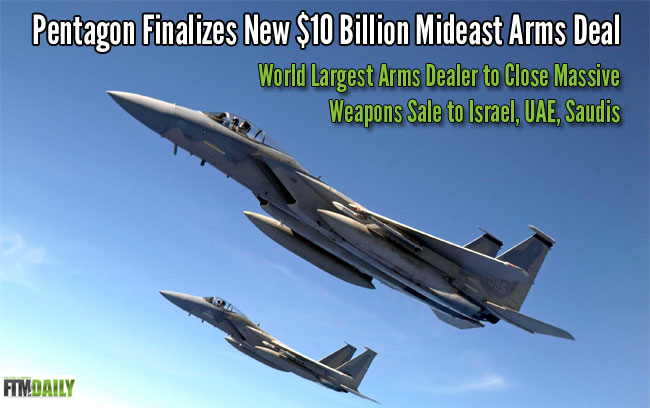
by Jerry Robinson, FTMDaily.com Editor-in-Chief
After a year of secret negotiations, the world’s largest arms dealer, the Pentagon, has announced that it is finalizing a preliminary agreement on a complex $10 billion Mideast arms deal with Israel, Saudi Arabia and the United Arab Emirates.
According to one U.S. Defense official, the deal is “one of the most complex and carefully orchestrated arms packages in American history.”
Defense Secretary Chuck Hagel recently embarked on a six-day trip that includes meetings with officials in Israel, Jordan, Saudi Arabia, Egypt and the United Arab Emirates.
According to Hagel, the goal of the Mideast trip is “to deepen and strengthen his relationships with all of these countries.” Translation: Hagel will push the three countries to finalize their purchases and submit formal letters of request, which can then be used to gain approval from Congress.
Defense officials say they have kept lawmakers apprised of the negotiations over the last year and provided an updated briefing to Congress earlier this week.
The arms deal is expected to sail through Congress amid strong pressure from domestic weapons manufacturers. In addition, U.S. lawmakers appear eager to increase funding sources for the U.S. military in the wake of the controversial budget cuts adversely impacting the Pentagon.
The Arms Deal Breakdown
According to the terms of the deal:

Israel has requested: KC-135 refueling planes, anti-radiation missiles, which will help Israel destroy enemy air-defense radars, new advanced radar capability for Israeli jets, and several V-22 Osprey Troop Transport aircraft (Interestingly, this is the first time that the U.S. has publicly sold the tilt-rotor Osprey to a foreign nation.)
UAE has requested: Around two dozen F-16 Desert Falcon jets produced by Lockheed Martin (worth approximately $5 billion) and advanced aircraft missiles (The UAE has also expressed interest in purchasing an Osprey. However, it is unlikely that the U.S. will approve one in this current deal.)
Saudi Arabia has requested: Advanced aircraft missiles. (These missiles are the same type being sold to the UAE and are designed for use with the 84 Boeing F-15 fighter jets that the Saudis purchased from the Pentagon earlier in 2010.)
U.S. officials defended the weapon sales as a protective measure in the the event of a conflict with Iran. Like the U.S., all three Middle East countries have publicly stated their strong opposition to a nuclear Iran.
The goal of the Obama administration has been to sell weapons both to key Arab allies and to Israel, while maintaining America’s long-standing policy of maintaining Israel’s military superiority within the region.
President Obama reiterated this policy directly to top Israeli officials in his recent trip to Israel, pledging that the U.S. remains committed to providing the country with “security assistance” and “advanced military technology.” More recently, defense officials have assured Israel that U.S. weapons sales to Arab countries (Israel’s enemies) will be heavily monitored by U.S. Air Force personnel stationed in the region. In the past, Israel has expressed concern with massive U.S. weapons sales to neighboring Arab nations. However, Defense officials stated that the recent arms negotiations were less strained as they occurred with all three countries simultaneously.
After the sale is complete and the weapons are delivered, U.S. military forces will stage joint-training sessions with each of the countries.
As the leader in the global arms trade, the Pentagon controls approximately 78% of worldwide weapons sales.
According to an August 2012 report from the New York Times:
“Overseas weapons sales by the United States totaled $66.3 billion last year, or more than three-quarters of the global arms market, valued at $85.3 billion in 2011. Russia was a distant second, with $4.8 billion in deals. A worldwide economic decline had suppressed arms sales over recent years. But increasing tensions with Iran drove a set of Persian Gulf nations — Saudi Arabia, the United Arab Emirates and Oman — to purchase American weapons at record levels.”
And while the global arms trade is certainly a lucrative business for America, this $10 billion deal is relatively small compared to a 2010 arms deal with Saudi Arabia worth $60 billion. The sale, which remains the largest U.S. arms deal in the region, included 84 Boeing F-15 fighter jets and more than 100 attack helicopters. The construction of the first batch of F-15s were just recently completed in St. Louis and are currently being flight tested at Wright-Patterson Air Force Base, Ohio.
QUICK FACT: Israel receives more annual U.S. military aid than any other foreign country. The latest White House budget calls for $3.4 billion in aid to Israel in FY 2014.
Sources: Defense.gov; NYTimes.com








